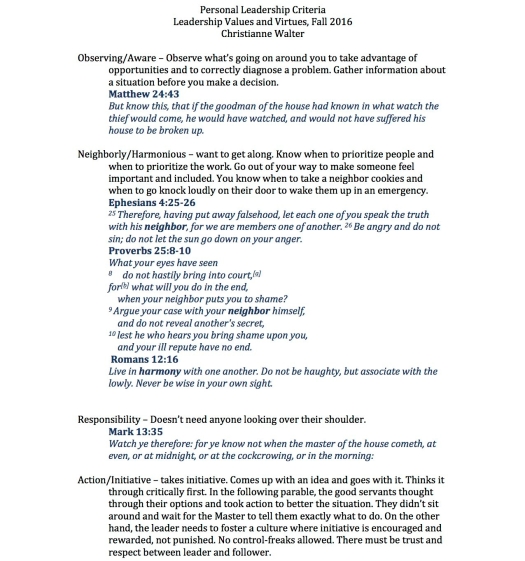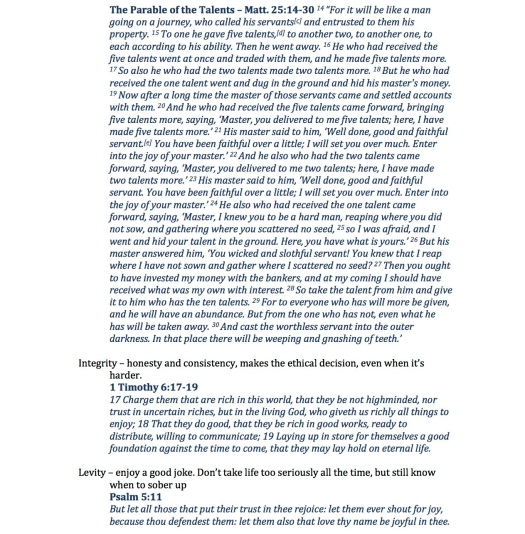Over the course of my leadership journey in school, I have grown in my self-awareness. This is partly due to my newfound understanding of my personality preferences according to the Myers-Briggs Type Indicator Test. According to this test, I am an ISTJ. Thinking is my dominant trait, which I prefer to in my inner world as an introvert. Sensing is my auxiliary trait, which I use when I interact with the outside world as a balance to my dominant trait.
The official MBTI website describes this Type as “quiet, serious, earn success by thoroughness and dependability. Practical, matter-of-fact, realistic, and responsible. Decide logically what should be done and work toward it steadily, regardless of distractions. Take pleasure in making everything orderly and organized – their work, their home, their life. Value traditions and loyalty.” I can identify with all of these descriptors. As I read through them, situations come to mind that confirm their validity.
My primary source of energy comes from my own internal world. I rejuvenate best when I am on my own or with my best friend or family. We recently had a friend stay on our living room couch for a week and it definitely proved how much I value my private space. She stayed either in the house or with me the entire time, inviting herself into every aspect of my life. As much as I love this girl, I began to get anxious for the first time in my life. By the end of the week my body would occasionally tremble involuntarily, I felt constantly nauseous, and I had difficulty falling asleep or focusing on tasks. The moment she drove away, my appetite returned and I fell on the couch to sleep. It was an uncanny, but educational experience.
I have a weak preference between sensing and intuition in the way I take in information. Like someone with intuition, I tend to see the bigger picture when I look at a scene. Yet at the same time, I observe details that speak to the bigger picture using all of my senses.
Usually, I prefer to base my decisions in logic and on principle. Growing up, I would always identify with Spock, the emotionless, logic-driven Vulcan from Star Trek. To this day, I still prefer the logic in strategic decisions, although I have lately been learning how to make more feeling-based decisions. My roommate is a very feeling person who doesn’t always agree with my decisions, even if she recognizes the logic behind them. It is a good exercise, but my preference still hasn’t changed.
I have 5, 10, and 40-year plans for my life. I make lists and plan ahead and keep journals. I am more comfortable when decisions have been made and a plan is settled upon. However, I am internally open to deviation from said plan, if a better option presents itself. This reflects my extroverted preference for judging and my introverted preference for perceiving.
“[Sensing-Thinking types] are often found in careers that require a technical approach to things, ideas, or people, and tend to be less interested in careers that require nurturing of others or attending to their growth and development,” according to the MBTI website. Currently, in school, I am studying business accounting. If I make this my profession, then I imagine it will fit my type preferences very well. Most of accounting work is individual (Introversion) and requires one to be very observant of details while keeping a bigger picture in mind (Sensing). Decisions must be made logically (Thinking). There’s not much emotion in numbers and what ever emotion does get attached to the numbers must be ignored on an ethical basis. Lastly, accountants are expected to make decisions based on their work and be organized and confident in their answers (Judging).
I think of the verse that goes something like, “a man cannot have two masters—he cannot serve both God and money. Either he will love one and hate the other, or he will hate one and love the other.” If an accountant truly loved money, then that emotion could easily cloud their judgment and lead to harmful fraud. If, on the other hand, an accountant loved God, then they could be trusted to handle the money appropriately.
This exercise has really helped me to understand my preferences and the difference between myself and my peers. Someone’s spontaneity that might previously have annoyed me can now be embraced as a wonderful difference. It doesn’t matter if it’s not my preference to be spontaneous—I can enjoy the experience with insider knowledge.




You must be logged in to post a comment.